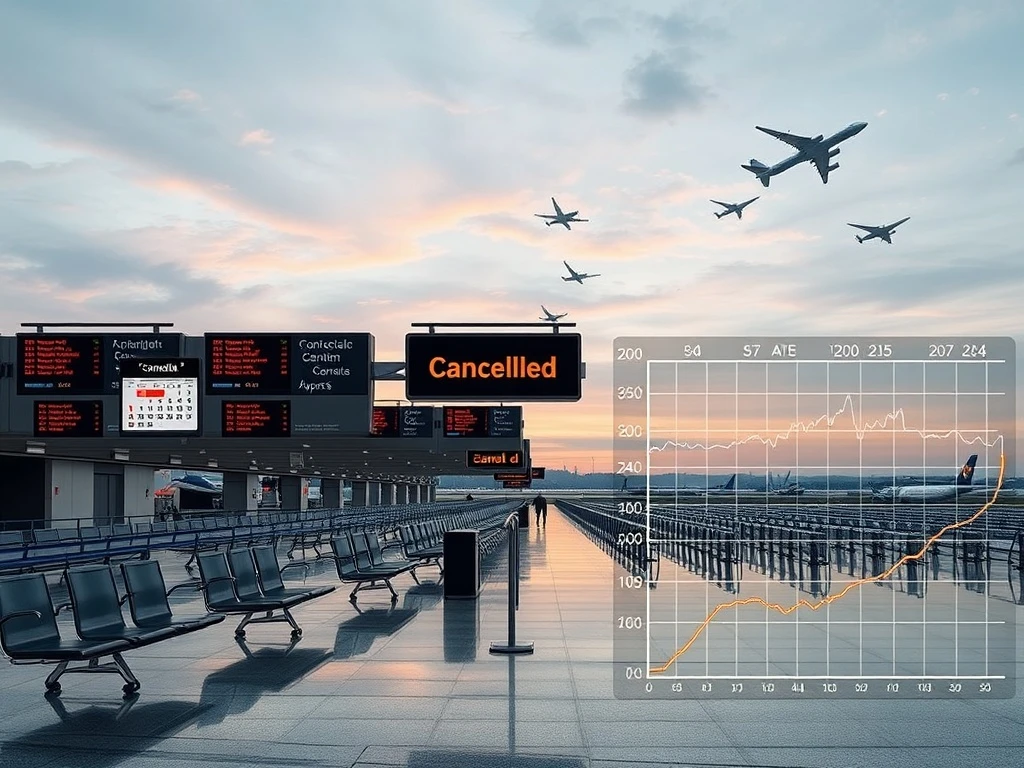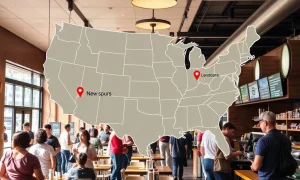Unforeseen challenges often disrupt the best-laid plans. Recently, a significant development has sent ripples through the travel industry and the nation’s capital. Multiple airlines have, in an unprecedented move, halted their Washington D.C. flights. This critical decision impacts countless travelers, businesses, and the very fabric of daily operations in the political and economic hub. Businesses, entrepreneurs, and frequent travelers are now grappling with the immediate consequences of this widespread flight disruption.
Understanding the Halt in Washington D.C. Flights
The sudden cessation of Washington D.C. flights stems from a complex interplay of factors. Authorities cite a combination of severe operational challenges and heightened security protocols. Firstly, a critical system malfunction within air traffic control networks significantly compromised operational safety. This issue affected the ability to manage the high volume of air traffic typically flowing into and out of the capital’s airports. Secondly, new intelligence indicated a need for enhanced security screenings, which further slowed down ground operations. Therefore, airlines faced an impossible choice: compromise safety or suspend services.
Consequently, major carriers collectively decided to prioritize passenger safety and operational integrity. This difficult decision means all commercial Washington D.C. flights are temporarily suspended. The affected airports include Ronald Reagan Washington National Airport (DCA) and Washington Dulles International Airport (IAD). This measure aims to allow for thorough system checks and the implementation of new security measures. Thus, the immediate goal is to restore full confidence in the air travel system.
Immediate Fallout for Travelers and Businesses
The halt in Washington D.C. flights has created immediate and widespread disruption. Thousands of travelers found themselves stranded at various airports across the country. Many others had their travel plans canceled outright. For instance, business professionals missed crucial meetings. Tourists saw their long-awaited vacations vanish. Families faced unexpected delays in reuniting. This situation directly impacts personal and professional lives.
Furthermore, businesses dependent on air travel are feeling the pinch. Consider the implications:
- Supply Chain Disruptions: Companies relying on air cargo for time-sensitive deliveries face significant delays. Perishable goods and critical components cannot reach their destinations quickly.
- Missed Opportunities: Executives cannot attend vital conferences or client pitches in person. This can lead to lost contracts and reduced revenue.
- Increased Costs: Travelers and businesses must find alternative transportation. This often means more expensive and time-consuming options like trains or rental cars.
Therefore, the ripple effect extends far beyond the airport terminals. Local businesses, especially those in hospitality and transportation, are experiencing a sharp decline in revenue. Hotel bookings have plummeted, and taxi services see fewer fares. This scenario highlights the interconnectedness of modern economies.
Economic Impact of Reduced Washington D.C. Flights
The cessation of Washington D.C. flights poses a significant threat to the local and national economy. Washington D.C. serves as a major hub for government, diplomacy, and international business. Its economy heavily relies on a constant flow of visitors and professionals. Firstly, the tourism sector suffers immensely. Hotels, restaurants, and attractions depend on visitors for their livelihoods. Reduced foot traffic translates directly into reduced income for these establishments.
Secondly, the convention and events industry faces substantial losses. Many organizations choose Washington D.C. for major conferences due to its accessibility. Without reliable air travel, these events become unfeasible. Consequently, millions of dollars in potential revenue are lost. Thirdly, the federal government’s operations, while primarily local, also experience delays. Inter-agency travel and coordination become more challenging. Moreover, contractors and consultants cannot easily access the capital for essential work.
Economists are now assessing the potential long-term damage. Prolonged disruptions could deter future investment and tourism. This could shift economic activity to other cities. Therefore, a swift resolution is paramount to mitigate these financial setbacks. The city’s economic resilience is being tested. However, the community is working together to find solutions.
Airline Perspectives and Government Response
Airlines did not make this decision lightly. Their primary concern remains passenger safety. They are working closely with federal agencies to resolve the underlying issues. Furthermore, airlines are providing flexible rebooking options and refunds to affected passengers. They understand the frustration this situation causes. Their goal is to resume normal operations as quickly and safely as possible.
The federal government has also responded swiftly. Key agencies, including the Federal Aviation Administration (FAA) and the Department of Homeland Security (DHS), are leading the efforts. They are working tirelessly to:
- Identify and Rectify System Malfunctions: Engineers are diagnosing and repairing the air traffic control system issues. This is a top priority.
- Enhance Security Protocols: New screening technologies and procedures are being fast-tracked. These measures aim to restore public confidence in air travel security.
- Communicate Updates: Regular briefings are being provided to the public and airline industry. Transparency is crucial during such times.
Additionally, emergency relief measures are under consideration for businesses severely impacted by the reduction in Washington D.C. flights. These measures could include grants or low-interest loans. Such support would help local enterprises weather the storm. Ultimately, a coordinated effort is essential for recovery.
Navigating the Future of Washington D.C. Flights
The path forward for Washington D.C. flights involves several critical steps. Firstly, authorities must complete comprehensive safety audits. These audits will ensure all systems are fully operational and secure. Secondly, airlines need to rebuild their flight schedules. This process can take time due to aircraft and crew positioning. Thirdly, public confidence must be restored. Clear communication about improved safety measures will be vital.
Travelers should stay informed through official airline announcements and government advisories. Flexibility remains key for anyone planning to visit the capital. Consider alternative transportation methods where possible. For businesses, exploring remote work solutions or virtual meetings can help mitigate disruptions. Adaptability is crucial in these uncertain times. Moreover, the long-term implications might include a review of national air travel infrastructure. This could lead to significant upgrades.
In conclusion, the temporary halt in Washington D.C. flights presents a formidable challenge. However, a concerted effort from airlines, government agencies, and the public can overcome it. The focus remains on ensuring safety and restoring the vital connectivity that Washington D.C. relies upon. The resilience of the travel industry and the capital’s economy will undoubtedly shine through this period of disruption.
Frequently Asked Questions (FAQs)
Q1: Why have multiple airlines stopped flying to Washington D.C.?
A1: Airlines halted Washington D.C. flights due to severe operational challenges, including a critical air traffic control system malfunction, and the implementation of heightened security protocols. These measures prioritize passenger safety and system integrity.
Q2: Which airports in Washington D.C. are affected by the flight disruptions?
A2: The primary airports affected by the halt in Washington D.C. flights are Ronald Reagan Washington National Airport (DCA) and Washington Dulles International Airport (IAD). All commercial flights to and from these airports are temporarily suspended.
Q3: How long are Washington D.C. flights expected to be suspended?
A3: Authorities have not provided a definitive timeline for the resumption of Washington D.C. flights. The duration depends on the completion of system repairs, security enhancements, and comprehensive safety audits. Travelers should monitor official announcements for updates.
Q4: What should travelers do if their Washington D.C. flight is canceled?
A4: Travelers with canceled Washington D.C. flights should contact their airline directly for rebooking options or refunds. Many airlines are offering flexible changes. Additionally, consider alternative transportation methods like trains or buses, and stay informed through official advisories.
Q5: What is the economic impact of the halt in Washington D.C. flights?
A5: The economic impact is significant, affecting tourism, hospitality, and the convention industry. Businesses face supply chain disruptions and missed opportunities. The federal government’s operations also experience delays. This situation could lead to substantial financial losses for the region.
Q6: Is the government providing any assistance to businesses affected by the flight cancellations?
A6: The federal government is assessing the situation and considering emergency relief measures. These may include grants or low-interest loans for businesses severely impacted by the reduction in Washington D.C. flights. More details are expected to be announced.
























